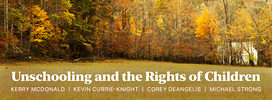Kevin Currie-Knight points out that we should advocate unschooling because the research suggests it works—and that we should oppose unschooling if the evidence suggests otherwise. Scientific evidence is a potentially powerful tool that can help us learn about education policy. But research shouldn’t be the main factor determining whether society should support unschooling. Here’s why.
To my knowledge, no random assignment studies exist linking unschooling or homeschooling to student outcomes. Put differently, while the research base currently leans in favor of home education, none of the existing studies can overcome the problem of selection bias. At the moment, families choosing unschooling for their children are likely more advantaged than families sending their children to government-run schools. Students with access to unschooling likely have families with the resources and motivation it takes to pull them out of the free government-run schools. In other words, the superior outcomes demonstrated by students educated at home might be explained by background rather than education type.
What if unschoolers become a relatively less advantaged group in the future? The research—limited by design—could very well swing “negative” because of the change in the student population rather than a change in the effectiveness of unschooling. In this scenario, the true effect of unschooling on student outcomes could be positive while the evidence appears negative. In other words—we would actually harm students if we decided to forbid unschooling based on limited evidence.
But let’s assume we had a rich body of random assignment studies with large samples (the gold standard of research design) to evaluate the effectiveness of unschooling. It would be more useful and more informative.
But we’d still have some serious problems.
Even studies using random assignment rely on the law of large numbers. In other words, the best scientific tool we have available still only allows us to calculate average effects for large groups—even with random assignment, we are not able to determine the effect of any program for an individual student. This limitation is important because, mathematically, individual students in the sample might have benefited from unschooling even if the overall average effect is negative. In other words, a uniform policy banning unschooling might harm individual students in the sample that were actually benefiting from unschooling.
Then comes the question of external validity. What we can learn—even from the best studies—is limited by the students in the sample and the program being evaluated. A rigorous study might reveal negative effects of a specific unschooling program for one cohort of students in a specific year. But student cohorts change over time. And program effectiveness changes over time. Government officials could decide to close down an unschooling community—based on historical evidence—that would improve over time and start working really well for newer sets of students.
And we’re still not done yet.
What outcomes will be used to determine whether to forbid unschooling—and who gets to pick the metric of success? My bet is that regulators would primarily focus on standardized test scores. It is, after all, the state’s preferred “accountability” metric for government-run schools and schools of choice. The main problem is that standardized test scores aren’t strong proxies for students’ long-term outcomes—and families want to do so much more for their children than simply maximize math and reading test scores. In other words, regulators could harm students’ long-term outcomes by shutting down their unschooling community based mostly on lackluster test scores.
What’s worse—I’m not confident that government officials would use random assignment methodology to determine which unschooling communities are permissible. School choice regulators, for example, have focused primarily on standardized test score levels, which do not account for differences in student backgrounds.
Even the best tools available to central planners are limited in important ways. Those limitations can lead to severe unintended consequences. But what should we do about the small set of parents who might make objectively bad education decisions for their kids? Where should we draw the line when it comes to educational freedom?
This is a very tough issue. The state should obviously intervene if other members of society report clear acts of abuse or negligence by the parents—but that is much different than the government defining and enforcing what education quality means for everyone. I agree with Kerry McDonald’s argument that although “there will be instances when parents fail,” granting the government the power to regulate the education of all children is the bigger risk. Most families know much more about their children’s needs than bureaucrats sitting in offices hundreds of miles away.

